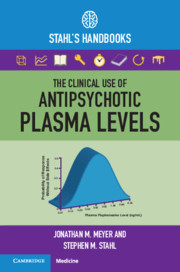Crossref Citations
This Book has been
cited by the following publications. This list is generated based on data provided by Crossref.
2019.
The Clozapine Handbook.
p.
90.
Hart, Xenia M.
Hiemke, Christoph
Eichentopf, Luzie
Lense, Xenija M.
Clement, Hans Willi
Conca, Andreas
Faltraco, Frank
Florio, Vincenzo
Grüner, Jessica
Havemann-Reinecke, Ursula
Molden, Espen
Paulzen, Michael
Schoretsanitis, Georgios
Riemer, Thomas G.
and
Gründer, Gerhard
2022.
Therapeutic Reference Range for Aripiprazole in Schizophrenia Revised: a Systematic Review and Metaanalysis.
Psychopharmacology,
Vol. 239,
Issue. 11,
p.
3377.
2022.
Drug Disposition and Pharmacokinetics.
p.
416.
2023.
The Lithium Handbook.
p.
362.
2023.
The Lithium Handbook.
p.
151.
2023.
The Lithium Handbook.
p.
vii.
2023.
The Lithium Handbook.
p.
203.
Paribello, Pasquale
Manchia, Mirko
Pinna, Federica
Isayeva, Ulker
Squassina, Alessio
Pisanu, Claudia
Balderi, Lorenzo
Contu, Martina
Pinna, Marco
and
Carpiniello, Bernardo
2023.
Pharmacokinetic Markers of Clinical Outcomes in Severe Mental Illness: A Systematic Review.
International Journal of Molecular Sciences,
Vol. 24,
Issue. 5,
p.
4776.
2023.
The Lithium Handbook.
p.
95.
2023.
Case Studies: Stahl's Essential Psychopharmacology.
p.
279.
Atkins, Matthew
Taylor, David
Catalan, Ana
Desouza, Neville
Chesney, Edward
Reilly, Thomas J.
Baburina, Irina
Hilaire, Mary Rose
Dratcu, Luiz
Harland, Robert
Salamone, Salvatore J.
and
McGuire, Philip
2023.
Point of care assay for blood aripiprazole concentrations: development, validation and utility.
The British Journal of Psychiatry,
Vol. 223,
Issue. 2,
p.
389.
Schoretsanitis, Georgios
Meyer, Jonathan M.
Conca, Andreas
and
Hiemke, Christoph
2023.
Personalized switching from oral to long-acting injectable second-generation antipsychotics in schizophrenia treatment using pharmacokinetic considerations.
Expert Opinion on Drug Metabolism & Toxicology,
Vol. 19,
Issue. 4,
p.
189.
2024.
Clinical Reasoning and Decision-Making in Psychiatry.
p.
209.
Colita, Cezar-Ivan
Hermann, Dirk M.
Filfan, Madalina
Colita, Daniela
Doepnner, Thorsten R.
Tica, Oana
Glavan, Daniela
and
Popa-Wagner, Aurel
2024.
Optimizing Chronotherapy in Psychiatric Care: The Impact of Circadian Rhythms on Medication Timing and Efficacy.
Clocks & Sleep,
Vol. 6,
Issue. 4,
p.
635.
Fernández-Miranda, Juan José
Díaz-Fernández, Silvia
Cepeda-Piorno, Francisco Javier
and
López-Muñoz, Francisco
2024.
Long-Acting Injectable Second-Generation Antipsychotics in Seriously Ill Patients with Schizophrenia: Doses, Plasma Levels, and Treatment Outcomes.
Biomedicines,
Vol. 12,
Issue. 1,
p.
165.
Wang, Yanlin
Harlin, Matthew
Larsen, Frank
Wang, Xiaofeng
Park, Wansu
Rich, Benjamin
Gobburu, Jogarao V.
and
Raoufinia, Arash
2024.
Population Pharmacokinetics and Dosing Simulations for Aripiprazole 2‐Month Ready‐to‐Use Long‐Acting Injectable in Adult Patients With Schizophrenia or Bipolar I Disorder.
Clinical Pharmacology in Drug Development,
Vol. 13,
Issue. 6,
p.
631.
O’Neill, James R.
Taylor, David M.
and
Horowitz, Mark A.
2024.
Using in silico methods to determine optimal tapering regimens for decanoate-based long-acting injectable psychosis drugs.
Therapeutic Advances in Psychopharmacology,
Vol. 14,
Issue. ,
Wiener, Mark
and
Mihai, Cristiana
2024.
Case Studies: Stahl's Essential Psychopharmacology.
p.
109.



